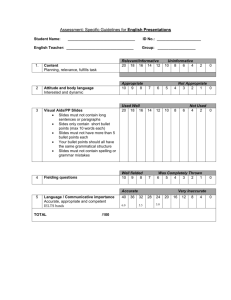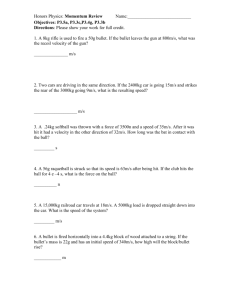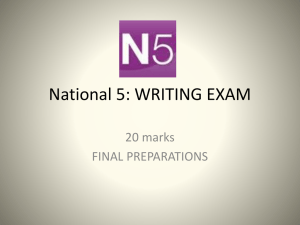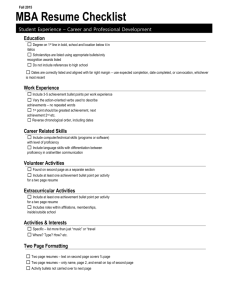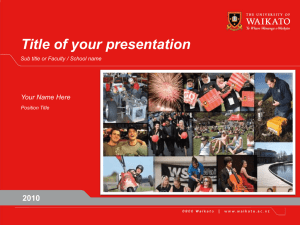#1 Brain Basics (Read along and Individual Research) Add
advertisement
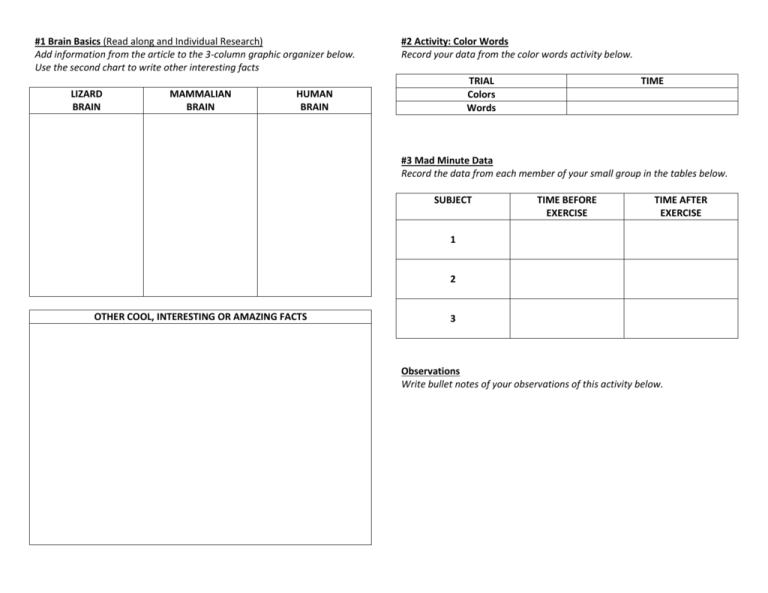
#1 Brain Basics (Read along and Individual Research) Add information from the article to the 3-column graphic organizer below. Use the second chart to write other interesting facts LIZARD BRAIN MAMMALIAN BRAIN #2 Activity: Color Words Record your data from the color words activity below. TRIAL Colors Words HUMAN BRAIN TIME #3 Mad Minute Data Record the data from each member of your small group in the tables below. SUBJECT TIME BEFORE EXERCISE TIME AFTER EXERCISE 1 2 OTHER COOL, INTERESTING OR AMAZING FACTS 3 Observations Write bullet notes of your observations of this activity below. #4 Get Moving, Feed Your Brain and Let It Rest (Powerpoint Notes) Get Moving: List the ways exercise helps your brain. * #5 Effort Matters Most (Think-Pair-Share) Read the article and write bullet notes. Share and add notes to your list from your partner’s list. * * * * * * * * * Feed Your Brain: Write bullet notes about fuel and your brain below. * * * * * * * * * * * Let Your Brain Rest: Write bullet notes about sleep and your brain * * * * * * * * * * * * #6 Brain Diagram Color, label and add information from this unit around the brain diagram. This is a deep digging assignment so use it to show what you know about the brain! # 7 Effort Matters Most Summary Paragraph 1. Underline the bullet note from your bullet list that you think is most important.(Assignment #5) 2. Turn your underlined bullet note into a complete sentence. This will be the topic sentence for your paragraph. 3. Select 5-8 other bullet notes. Each one will be another sentence in your paragraph. 4. Write one last sentence as a conclusion to your paragraph. #8 Observations: Your Brain, Your Learning and Teenage Brain Video Notes Teenage Brain Video Notes As the owner and user of your brain, you know more about it than anyone. List your own successful learning experiences and brain strategies below. * * Learning Experiences: Examples of when I learn best/easiest… * * * * * * * * * Active Learning: When I need to learn/remember something, the strategies I use include… * * * * * * * * * * Optimal Brain Function: My brain works best when… * * * * * * * * * #9 Activity: 20 Objects List the objects you remember below: #10 Brain Strategies List Write bullet notes from your section of the “Make Learning Sticky” article. Brainstorm additional learning strategies with your group and list them below. As a group, create a poster to share your section of the article. Tomorrow, we will do a walkabout and you will add brain strategies to your list. Article Section Name: # of Objects Remembered: _____/20 * * * * Activity: 20 Objects with Strategy We are going to repeat the “20 Objects Activity” but this time you will use a strategy to help you remember more objects. Strategy to Help Remember: List the objects you remember below: # of Objects Remembered: _____/20 Brain Learning Strategies: * * * * * * * * * * * * * * * * * * * * #11 Write Up: Brain Experiment As a small group, you will come up with a question about maximizing brain performance. As an intro to designing experiments, you will use this question to practice how to use the scientific method to answer that question. You won’t actually do the experiment so you won’t use all the steps of the scientific method, but this is a way to get us started asking our own questions and designing experiments to answer them. Hypothesis: Question: because (describe why you think you would get those results) Background Information: As a group, find one source of information related to your question. Write down your source and some bullet notes from it. Experiment (List the steps of the experiment you would do…remember you aren’t going to actually perform the experiment! Also, you don’t have to use all the lines below.) Source: Notes: (Dig deep and find another source outside of class and complete assignment #13) If (describe what you would do in your experiment) then(describe what you think the results of your experiment would be) #12 Additional Brain Research Homework To dig deep, find 2 additional sources of information about the brain. Cite your sources and include notes (any format) from each source. #13 Additional Background Information for Brain Experiment To dig deep, find 1 additional sources of information outside of class that is related to your brain experiment. Cite your source and include notes (any format) from each source. Source #1: Brain Experiment Question (From assignment #11) Notes from source #1: Source: Notes from additional source: Source #2: Notes from source #2:
